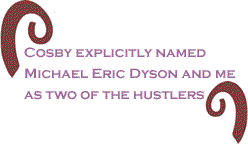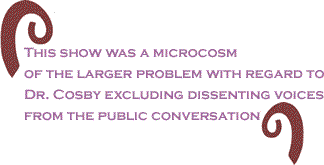
|
|||||||||||||||||||||
 |
|||||||||||||||||||||
 |
|||||||||||||||||||||
 |
|||||||||||||||||||||
 |
|
This article originally appeared in Playahata.com. I promised myself that I wouldn’t write about this. But I’m frustrated and need to vent. A few weeks ago, my piece about Bill Cosby turned me into a lightning rod for both legitimate critique and mean-spirited criticism. Perhaps the most surprising and troubling response has come from Dr. Cosby himself. The day that I published the piece, Dr. Cosby made a call to the dean of my college. To be fair, the Coz explicitly stated that he didn’t want the dean to do anything to me. Instead, he wanted to express his concern that I was undermining his project. Still, I’m sure that he understood the significance of the school’s most famous and coveted alumnus/donor making a call about a young, untenured professor. But it doesn’t stop there. Over the next few days, I did a series of radio interviews where I discussed the op-ed. In each interview, I reiterated both my respect for Dr. Cosby and my critique of his “Call Out” tour. I did a show in Atlanta with a Black conservative who decided that “he would put me in my place.” Over the next hour, I proceeded to punish him with reasoned arguments and strong examples.
A few minutes after the interview ended, I received a call from a friend in Atlanta. He told me, “Go on the internet and tune into the station. Bill Cosby just got on the radio and he’s talking about you!” I didn’t bother to ask how Bill Cosby, who I was sure wasn’t in Atlanta, knew that I was on the radio discussing him. Instead, I asked what he was saying about me. He replied, “He’s calling you a liar and a hustler. He’s saying that you have a ‘hip-hop website’ and that you can’t be trying to help Black people with a ‘hip-hop website.’” Words can’t convey the level of frustration that I felt at that moment. Why couldn’t he have just called in while I was on the air? I tuned back into the station to hear the end of Cosby’s diatribe. By this point, he and the host (who cosigned everything that Cosby said) were criticizing “the hustlers” who write about hip-hop and critique him at the same time. He explicitly named Michael Eric Dyson and me as two of the hustlers. I tried to call into the station but I couldn’t get on the guest line. My friend, who was on hold with the station, called me back via three-way and offered to let me speak to Cosby when it was his turn to speak. After a few minutes, I was on the air: Me: Hello. Dr. Cosby this isn’t [my friend]. This is actually Marc Lamont Hill. You were talking about me so I figured I’d call back so that we could talk.
Me: I don’t understand why you have to call me a liar and a hustler. Why can’t my response be just as sincere and principled as yours? Cosby never answered my question. Instead, he proceeded to grill me about my job, my affiliations, and my “hip-hop web site.” I attempted to explain the nature of my work–although he referenced the site, I doubt that he actually read anything – and the substance of my critique. Unfortunately, he insisted on talking over me and trying to “son” me. Unintimidated, I continued to attempt to offer my side of the story.
After 10 minutes or so, Cosby says “Mr. Hill. You’re a smart man. You’re a good writer. You’ve called here twice. You’ve had enough to say.” Suddenly, I was being constructed as the pest who was bothering HIM, when the truth was that he was calling in to get at me! I then tried to explain how this show was a microcosm of the larger problem with regard to Dr. Cosby excluding dissenting voices from the public conversation. Again, Dr. Cosby talked over me until the host intervened. He said, “One at a time. After the break, we’ll let Professor Hill respond and then Dr. Cosby can respond.” Cosby responded, “Mr. Hill has said enough. He’s got a column. He’s called here twice. Let’s take some calls.” The show went to commercial and the producer said to me, “Be patient. We’ll take 2 or 3 calls and get back to you.” I waited patiently as Cosby took multiple calls and threw out a few more disses. After all of the waiting calls were exhausted except for me, the host says “After the break, we’ll be right back with the next call.” Cosby responds, “I’m hungry, man. I want some dinner” and hangs up. Aggravated, I call back to the guest line and ask what happened. The show’s host immediately jumps on the line and says “I’m sorry. I totally forgot you were on the phone.” Right. Two of the show’s guests, one of whom is a worldwide celebrity, were arguing over a contentious issue and he simply forgot? The host apologized and agreed to let me come back on the air and give my closing comments. This time, however, he was considerably hostile to me. Every time I tried to make a point, he literally yelled over me (I guess having Dr. Cosby on the line gave him some newfound confidence) and finally said “I gotta let you go man.” The next day, Cosby calls my college again. What did he want? I won’t say in public. But one thing is for sure: he didn’t call to speak to me. Why am I writing this now? Because I’m learning a valuable lesson about what happens when you offer unpopular social criticism in public. Before this, I naively assumed that I could speak the truth (as I see it) to power and power would respond fairly. I fully expected to have to deal with people who don’t agree with me. I never, however, fully appreciated the extent to which people would use their power and privilege to silence alternate voices. Dr. Marc Lamont Hill, an assistant professor of urban education at Temple University, is one of the youngest members of the growing body of “Hip-Hop Intellectuals” in the country. His work, which covers topics such as hip-hop culture, sexuality, education, and politics, has appeared in numerous journals, magazines, books, and anthologies. He can be contacted at [email protected]. or at his website. |
|
| Home | |
Your comments are always welcome. Visit the Contact Us page to send e-Mail or Feedback or Click here to send e-Mail to [email protected] e-Mail re-print notice
If you send us an e-Mail message we may publish all or part of it, unless you tell us it is not for publication. You may also request that we withhold your name. Thank you very much for your readership. |
|
| June 15, 2006 Issue 188 |
||||||||||||||
|
||||||||||||||
|
||||||||||||||
| Printer Friendly Version in resizeable plain text format | ||||||||||||||
 |
||||||||||||||
 |
||||||||||||||
 |
||||||||||||||
 |
||||||||||||||
| |
||||||||||||||
| |
||||||||||||||





























